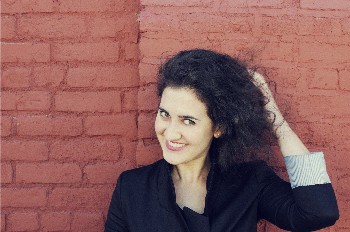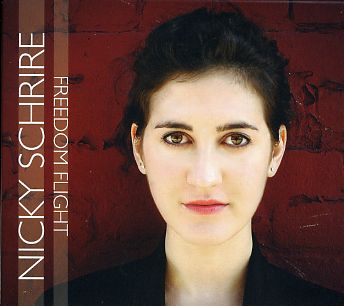Fuse Jazz Review: Singer Nicky Schrire at Scullers — Beyond Words
Songs sometimes climax with Nicky Schrire improvising in a pure tone way up in her top register, like a bird darting on an updraft.
By Jon Garelick.
Nicky Schrire is a 27-year-old South African, now living in New York, who is one of the new breed of jazz singers. She clearly identifies as jazz, but her book is not standards-driven. Covers tend to come from the Beatles, Bob Dylan, Loudon Wainwright, and even Florence Welch of indie-rock darlings Florence and the Machine. And, unlike jazz singers of yore, she writes a lot of her own material. Though her approach has earned her comparisons to Gretchen Parlato and Becca Stevens, the similarities are superficial. Like Parlato, she’s an assured technician with a whole bag of impressive tricks. Like Stevens and, for that matter, Esperanza Spalding, she has an affinity for folk. But, as she displays on her only disc, Freedom Flight, and proved at Scullers on Thursday night with her quartet, she’s got her own thing, and it’s very much worth listening to.
At Scullers, she started with an original, “Together,” which began with a single interval repeated on the piano, then rhythm on hand percussion, and then a wordless major-key melody. Schrire does a lot of wordless singing. Her lyrics are simple, homespun, skirting sentimentality even when their purpose is straightforward affirmation (“We will cross this land together”). Her “jazz” is in her chords and in those wordless melodies and the improvisations they inspire. This isn’t “scat” singing—none of the note-stuffed runs of bebop syllables but more of a simple ooh-ahh, om-bah-yay approach, with lots of long held notes sketching the arc of a melody.
On “Together” she worked the song into high held tones that seemed to take the band with her into more agitated rhythms and then catapulted them into their own series of solos. She sings with little or no vibrato, which also helps account for the unaffected directness of her approach. Songs sometimes climax with her improvising in a pure tone way up in her top register, like a bird darting on an updraft. And there’s a logic to Schrire’s wordless passages—sometimes they’re introductory, as if she’s gradually finding her way to the lyrics that fit her memories or emotions, and sometimes they take off from the lyrics as if in search of feelings that words cannot express.
Schrire’s band members weren’t just improvising on chord changes but playing the songs (during the night she took duo turns with each). Pianist Glenn Zaleski and bassist Sam Anning always kept the melodies in close sight, often just paraphrasing them outright. Drummer Jake Goldbas not only had a strong arsenal of rhythms but a great touch, never overwhelming the singer even when he was playing hard.
Schrire does sing some standards, of course. (Her book includes “If Ever I Would Leave You” and “Someone To Watch Over Me.”) At Scullers she didn’t offer any Great American Songbook fare, but she sang the Beatles’ “Here Comes the Sun” (relishing the opportunity to land on and play with the repetition of “sun, sun, sun, here it comes”). The humor in Loudon Wainwright’s “The Swimming Song” inspired tickling improvisatory extremes. And an a cappella encore of the Bobby McFerrin arrangement of “Blackbird” gave her a chance to show off her technique, melding improvisations on the melody with her own hocketing rhythmic accompaniment.
Schrire’s new album, Space and Time, is due at the end of August. If we’re lucky, that will mean another visit to Boston soon.



Thanks for the report–I hadn’t heard anything about her. Look forward to checking her out! (Nice review, too–hope you do more for the Fuse.)